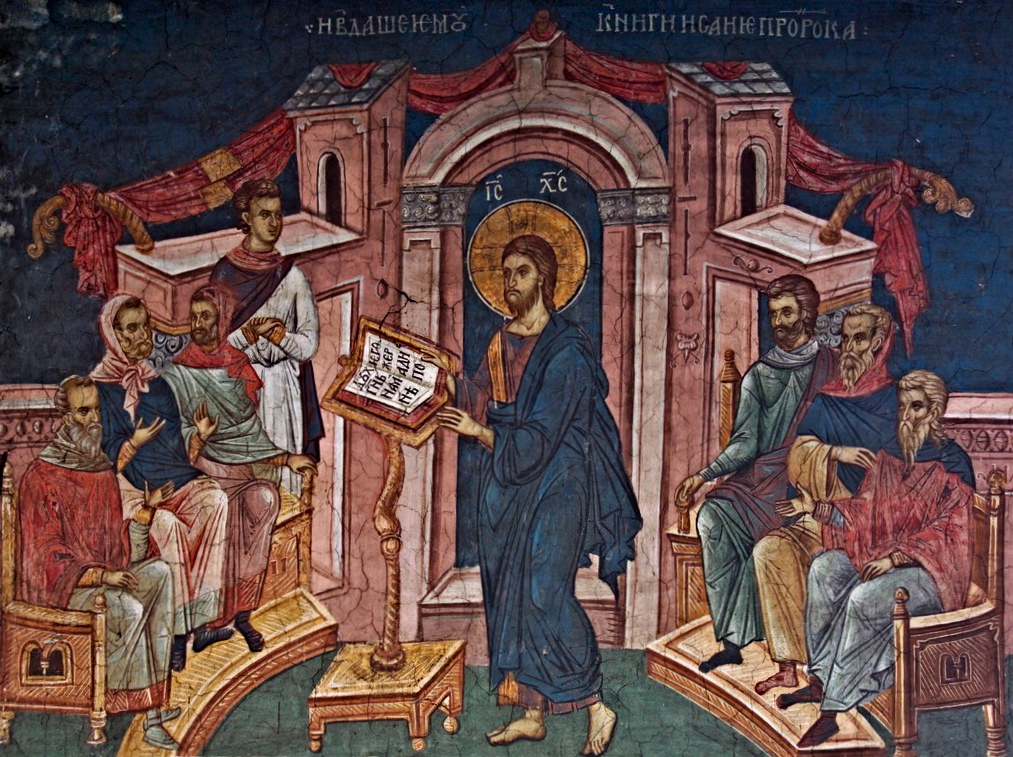“Jesus
taught in their synagogues and was praised by all.” What a wonderful way to start our Ordinary
Time walk through the Jesus’ earthly ministry, guided this year by Luke. We start out hearing of Jesus teaching, to
universal praise and acclaim, becoming a revered teacher given an
overwhelmingly positive reception. We
know that that’s not going to last. In
fact, by the end of this very chapter, the people who hear him teach react so
negatively that the try to push him off a cliff! When I started praying with this lectionary
selection and preparing myself to preach, it seemed a little odd to me that the
lectionary kind of gives us two and a half bits of Luke here. We read from the
dedication page, which tells us about Luke’s purpose in writing (to build up
our faith), then we jump to this little summary ("Jesus taught in their
synagogues and was praised by all”) that comes comes right after the Temptation
in the Desert, and then we start a story that kind of ‘zooms’ in on one
instance of Jesus teaching in a synagogue, but one that doesn’t end quite as
well as all the other examples that got summed up in one sentence. It almost
feels like we should have ended with a ‘to be continued’ sign, because (sorry
for the spoilers), the gospel we’ll hear next week is the negative reaction that
Jesus’ sermon in Nazareth gets. But, as
I sat more and more with the reading, and the lectionary’s choice of how to
carve up this pie, I began to see the wisdom.
It’s
right for us to start out with joy, continuing the theme that was sounded last
week when we heard John’s story of the Wedding at Cana, where Jesus acted
miraculously to extend joy. It’s right
for us to start out refreshed and buoyed up by hearing of Jesus receiving such
praise and adulation. Because it would
be so easy to skip over those two little summary verses, which tell of Jesus’
return to Galilee, his teaching in synagogues, and the great praise with which his
teaching was received. Partially, it
would be easy to skip over them because they are summary verses, sandwiched in
between two tales which are much more vividly painted: the Temptation of Christ
in the desert (and his temporary defeat of Satan, in foretaste of the permanent
defeat to be wrought later), and the inaugural sermon in Nazareth, which
results in the attempt to throw him off the cliff.
But,
it’s more than just the vividness with which the scenes are painted, it’s their
hue. It can be easy to focus on the
strength of the opposition, on the challenges, and the sorrows Jesus knew for
love of us, and lose sight of the joy and the wonder and the praise. And that’s part of what Jesus came to set us
free from. That’s part of what
constitutes our captivity, that we let the joy get overshadowed by the threat
and the sorrow.
And I’m
not saying we should read the world as “Polyanna”s, that we should ignore the
darkness Christ’s light came to cast away, the injustices, the binding from
which he came to free us. I’m saying we
can’t let those things keep us from the Joy of the Gospel. In his first apostolic exhortation, Pope Francis
writes of the power of Christ’s “offer of salvation to set [us] free from sin,
sorrow, inner emptiness and loneliness” and fill our hearts instead with joy.
So,
that’s how I see this choice of the lectionary as wise, as choosing to delay to
next week the end of the episode, the violent reaction Christ faced, and give
us this week to concentrate on sharing his joy at the positive reaction he
received. There’ll be plenty more time
to think of how God’s love for us is disclosed in Christ’s relentlessly acting
to save in the face of rejection and hardship.
Today, we rejoice with him in remembering the good days, and rejoice
with our world, that it gave our Lord so many good days. That joy that can be shared, engendered and
multiplied, is itself a fruit of the Spirit, the Spirit in whose power Jesus
acted, whose anointing we share through our initiation into Christ’s
Church. That joy is a force for
evangelization, as Pope Francis has reminded us through his words and through
his example, and it’s a way in which God effects our sanctification, our being freed
from the scripts of pessimism with which the world can try to bind us.
Choosing
to notice the good and rejoice in the good is not an escape from the darkness;
it’s what strengthens us to be able to do that without becoming lost in it. I
mentioned last week at the Sunday Masses how striking it is that Martin Luther
King’s “I have a dream” speech begins with the words “I am happy.” If we’re to
look brutally honestly at the ways we need to be freed, the ways we participate
in binding others, the ways we need to work with Christ in that liberating
mission, we need to start by looking for the graces, giving thanks for those,
and letting those warm our hearts. Because that’s how we’ll melt coldness of
heart, in ourselves and in those around us. That’s how we’ll let Christ set us
free.

No comments:
Post a Comment